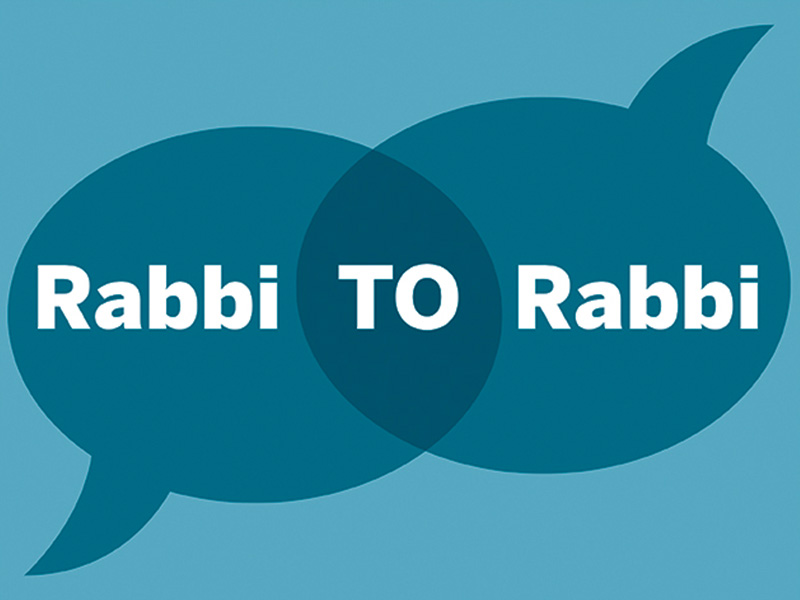Rabbis must address the denigration of other forms of Judaism and speak up against intra-Jewish disparagement whenever they hear it
Rabbi N. Daniel Korobkin
Beth Avraham Yoseph Congregation, Toronto
Rabbi Lisa Grushcow
Temple Emanu-El-Beth Sholom, Montreal
Rabbi Grushcow: I’ve just returned from England, where I had the pleasure of being the scholar-in-residence at a leading Reform synagogue.
My hosts, lay leaders in the synagogue, are very involved with progressive Judaism in Europe and worldwide. One of the topics of our conversation was the negativity expressed by more traditional Jews against more liberal ones. This is expressed in a wide range of contexts – anything from Orthodox rabbis refusing to stand beside non-Orthodox rabbis at official events to court battles to keep progressive synagogues from state recognition (which is very important in Europe), to disparaging remarks made at dinner parties.
Here is my question, posed with respect: why does it seem to be so difficult for those in the traditional camp to understand different ways of being Jewish? And why does it so often feel like open season on liberal Jews, even from those whose affiliation may be Orthodox, but whose practice is anything but?
My own feeling is that if someone is Jewishly connected, that’s a positive for the Jewish People as a whole. If there were only one form of Judaism – yours or mine – there are many people who would fall away from Jewish life entirely. For that reason, among others, I am adamant about not speaking badly about other denominations, and I don’t tolerate negative remarks against other Jews, but I’m not sure that practice is shared.
Rabbi Korobkin: It’s important to distinguish between two things that you’ve conflated. One is the unwillingness of some Orthodox rabbis to work with Reform rabbis on an institutional level. The other is interaction and acceptance of individual Jews as kinfolk between the Reform and Orthodox communities.
Do haters and xenophobes exist? Of course. If you’re looking for them, they can be found in both “camps.” But by and large, I have not encountered the insults and disparagements of Reform Jews that you speak of within the Orthodox world. If anything, there is a desire among most Orthodox Jews who seek to engage those outside their immediate community and to be genuinely tolerant of others’ expressions of Judaism while at the same time not shying away from their own pride in their Orthodoxy.
When it comes to institutional recognition of Reform Judaism – not Jews – that is a different kettle of fish. Some rabbis fear that giving recognition to Reform clergy also lends credence to their religious and/or theological positions, including Reform’s attitude to Halachah, which is untenable for Orthodoxy.
But I have rarely, if ever, heard an Orthodox rabbi insulting Reform Judaism from the pulpit. For most Orthodox rabbis, that battle was fought long ago – it’s water under the bridge.
Rabbi Grushcow: I find your response heartening, but I’m not entirely sure how to square it with the insults lobbed against Reform Jews that we hear from Israeli Orthodoxy on a regular basis. Perhaps this is simply a product of what happens when religion gets mixed with politics.
But I wonder: do Orthodox rabbis address the bad-mouthing of non-Orthodox Jews that goes on among congregants? I know it’s not a one-way street, but I also know that I consistently try to speak up against any intra-Jewish disparagement when I hear it. I’m fortunate to have good colleagues across denominations here in Montreal, and I’m confident we stand up for each other. But how might we better address the denigration of other forms of Judaism that goes on outside the walls of the synagogue?
Rabbi Korobkin: True, there’s always the occasional quote from a religious political figure in Israel bashing Reform Judaism. It makes for a titillating headline, but I just shake my head in dismay. Any invective among Jews is counterproductive, to say the least, and is reflective of the disunity that has prevented our redemption to date.
But in the end, I would offer you the same fatherly advice that I offer anyone facing bullies: don’t let the bully’s intimidation daunt you or diminish your efforts. Instead of insulting back, prove the bullies wrong. Show the naysayers that your Judaism is sincere, holy, consistent and fully committed.
In that vein, I would humbly suggest that the biggest threat to the new egalitarian prayer section at the Kotel (and I’d love to be proven wrong) is not the Orthodox criticisms of it, but rather the possibility that it may not be attended in large numbers by passionate daveners.
